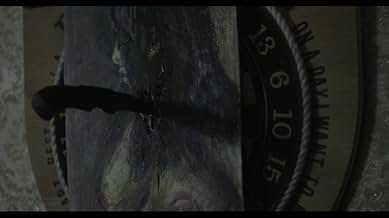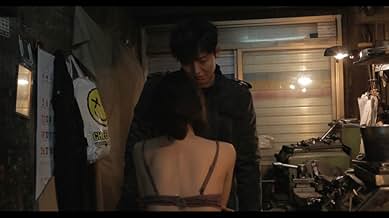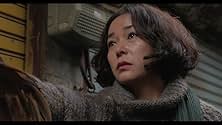CALIFICACIÓN DE IMDb
7.1/10
16 k
TU CALIFICACIÓN
Un prestamista usurero se ve obligado a reconsiderar su violento estilo de vida cuando llega una mujer misteriosa que dice ser su madre perdida hace mucho tiempo.Un prestamista usurero se ve obligado a reconsiderar su violento estilo de vida cuando llega una mujer misteriosa que dice ser su madre perdida hace mucho tiempo.Un prestamista usurero se ve obligado a reconsiderar su violento estilo de vida cuando llega una mujer misteriosa que dice ser su madre perdida hace mucho tiempo.
- Dirección
- Guionista
- Elenco
- Premios
- 25 premios ganados y 30 nominaciones en total
Lee Jung-Jin
- Gang-Do
- (as Jeong-jin Lee)
Woo Ki-hong
- Hoon-chul
- (as Ki-Hong Woo)
Cho Jae-ryong
- Tae-seung
- (as Jae-ryong Cho)
Heo Joon-seok
- Suicidal Man
- (as Jun-seok Heo)
Yu Ha-bok
- Container man
- (as Ha-bok Yu)
- Dirección
- Guionista
- Todo el elenco y el equipo
- Producción, taquilla y más en IMDbPro
Opiniones destacadas
Pieta is the story of revenge in a most brutal way possible by giving one's own life, a story of mother's love for his son. Story tells us the extreme measures taken by a mother to take the revenge from a non-human brutal loan shark.
Jung-Jin Lee is living a lonely life whose sole purpose is to recover the loan from other people by making them cripple and claiming their insurance money. In doing so he has become so cold inside that he feels nothing and know no pain. Brutality is the everyday life matter.
Enters a woman stirring everything by claiming that she is his mother. she make him feel love, make him angry and make him feel pain just to take the revenge of her son. And when Jung-Jin starts to feel human again, she inflicted the deep scar into his soul by giving her own life.
Movie is full of disturbing content and makes for a haunting viewing. I am a fan of south Korean cinema and this movie takes the love affair to another level.
8/10
Jung-Jin Lee is living a lonely life whose sole purpose is to recover the loan from other people by making them cripple and claiming their insurance money. In doing so he has become so cold inside that he feels nothing and know no pain. Brutality is the everyday life matter.
Enters a woman stirring everything by claiming that she is his mother. she make him feel love, make him angry and make him feel pain just to take the revenge of her son. And when Jung-Jin starts to feel human again, she inflicted the deep scar into his soul by giving her own life.
Movie is full of disturbing content and makes for a haunting viewing. I am a fan of south Korean cinema and this movie takes the love affair to another level.
8/10
The 18th feature film written & directed by Korean cinema's most notorious filmmaker, Pietà tells the story of a sadistic loan shark who ends up crippling people for not paying their debts, which after added interest is 10 times the amount they borrowed. Torturing with no feelings, his life takes a changing course when a middle-aged woman claiming to be his long lost mother comes into his life out of nowhere.
The film has all the disturbing elements one expects from Kim Ki-duk and although the first half has no easy-to-digest moments, the second half plays out very well to end on a satisfying, even rewarding, note. Cinematography reflects the appalling nature of the subject matter while editing presents a well-sought balance. The performances are pretty impressive from its two leads & the rest of filmmaking aspects are finely executed as well.
On an overall scale, Pietà is a highly tragic story of love, loss, revenge & redemption that has much more to offer than just disgust its viewers. Sure, Kim Ki-duk takes extreme pleasure in making his audience flinch but he also backs it up with enough justifications for the violence in his films. Shocking, unnerving, pitiful, haunting & infused with Christian symbolisms, Pietà is an unsettling psychological study of a mother-son relationship that also presents a fascinating take on what famously is Korean cinema's favourite genre.
The film has all the disturbing elements one expects from Kim Ki-duk and although the first half has no easy-to-digest moments, the second half plays out very well to end on a satisfying, even rewarding, note. Cinematography reflects the appalling nature of the subject matter while editing presents a well-sought balance. The performances are pretty impressive from its two leads & the rest of filmmaking aspects are finely executed as well.
On an overall scale, Pietà is a highly tragic story of love, loss, revenge & redemption that has much more to offer than just disgust its viewers. Sure, Kim Ki-duk takes extreme pleasure in making his audience flinch but he also backs it up with enough justifications for the violence in his films. Shocking, unnerving, pitiful, haunting & infused with Christian symbolisms, Pietà is an unsettling psychological study of a mother-son relationship that also presents a fascinating take on what famously is Korean cinema's favourite genre.
Korean thriller movies always surpries me with it's ending. We get through one concept and it turns to be another. While I was watching this, I thought it is a story of mother and son who were somehow separated. But the movie proves me wrong. Its not about the separation and reunion of mother son its about untold revenge.
Directed by Kim Ki-duk
Pieta is director Kim Ki-duk's eighteenth movie. When this fact appeared on the screen, a spontaneous applause erupted. Hugely under-appreciated at home, Kim Ki-duk is well-known beyond the borders of his country South-Korea. He does not conform to any rules, doesn't avoid sensitive subjects, and shows the harshness of life without any scruples, political, humanistic and in a very physical confronting approach. It is true that his films are usually not an easy watch; they certainly do not conform to idea that film equals entertainment. The free thinking soul will see that Kim Ki-duk's movies are not made to shock the audience just for the sake of it, but to show the thoughts of a brave artist, who exhibits a rare vulnerability and a frightening honesty in his approach to his subjects.
Actress Cho Min-soo who portrays the character Mi-son in the movie declares during the press conference: "His films are eyes to reality." Apparently she and Lee Jung-Jin, who brilliantly plays main character Gang-Do, barely knew who Kim Ki-duk was when they were asked to play the parts. They tell the press that during the process of making the movie they learned to act in a completely different way.
Made with a budget that is just a fraction of Korean film budgets these days, outsider Pieta entices the jury and the public, and makes a far more lasting impression than other more obvious candidates like "To the Wonder,""At any price" and "Fill the void." Even though malicious rumors say that the jury wanted to award "The Master" all the big prizes, Kim's film is rightfully the recipient of the Golden Lion. Accepting the prize, Kim thanked the actors, staff, film festival officials and Italian fans before bursting into a traditional Korean song.
The story of the film is about lone wolf, self-absorbed: masturbating, crazy moralless man who lends money to desperate workers of the industrial slum of Cheonggyecheon. He charges ten times the borrowed sum in interest. If his clients don't pay up, Gang-do cripples them, taking the insurance payments on their injuries to make up for the difference. His character is a metaphor for extreme capitalism. Kim commented: "...but not the money itself, you can change the face of money. Money is the third character."
Then a women shows up at his doorstep, claiming to be the mother who abandoned him as a baby. He tests her in some gruesome ways, before he acknowledges her presence and even begins to show signs of affection towards her. Mi-son also proves herself to him by being just as ruthless as him. They form a frightful but also strangely intriguing duo. The grim story finds some more breathing space for the audience towards the end, but a bitter aftertaste remains.
What makes Kim Ki-duk an excellent storyteller is that most of the graphic cruelty is not shown, but actually takes place in the viewer's imagination. He is able to show real life images that can represent abstract ideas. He can make an audience relate to his characters even though they are immoral and almost heartless human beings, doing this with so much ease is remarkable. It is a rare quality to be able to find beauty in the most harsh places and to somehow convey this strange beauty to the screen. To make you believe in the story, without realizing it is perhaps an absurd one. And maybe most important: to make the viewer emotionally gripped, while talking about universal human issues, emotions and ideas even though there are cultural differences that separate audience and filmmaker. Kim Ki-duk: "(Pieta is) an embrace to the whole of humanity. The movie is dedicated to humankind."
Pieta is director Kim Ki-duk's eighteenth movie. When this fact appeared on the screen, a spontaneous applause erupted. Hugely under-appreciated at home, Kim Ki-duk is well-known beyond the borders of his country South-Korea. He does not conform to any rules, doesn't avoid sensitive subjects, and shows the harshness of life without any scruples, political, humanistic and in a very physical confronting approach. It is true that his films are usually not an easy watch; they certainly do not conform to idea that film equals entertainment. The free thinking soul will see that Kim Ki-duk's movies are not made to shock the audience just for the sake of it, but to show the thoughts of a brave artist, who exhibits a rare vulnerability and a frightening honesty in his approach to his subjects.
Actress Cho Min-soo who portrays the character Mi-son in the movie declares during the press conference: "His films are eyes to reality." Apparently she and Lee Jung-Jin, who brilliantly plays main character Gang-Do, barely knew who Kim Ki-duk was when they were asked to play the parts. They tell the press that during the process of making the movie they learned to act in a completely different way.
Made with a budget that is just a fraction of Korean film budgets these days, outsider Pieta entices the jury and the public, and makes a far more lasting impression than other more obvious candidates like "To the Wonder,""At any price" and "Fill the void." Even though malicious rumors say that the jury wanted to award "The Master" all the big prizes, Kim's film is rightfully the recipient of the Golden Lion. Accepting the prize, Kim thanked the actors, staff, film festival officials and Italian fans before bursting into a traditional Korean song.
The story of the film is about lone wolf, self-absorbed: masturbating, crazy moralless man who lends money to desperate workers of the industrial slum of Cheonggyecheon. He charges ten times the borrowed sum in interest. If his clients don't pay up, Gang-do cripples them, taking the insurance payments on their injuries to make up for the difference. His character is a metaphor for extreme capitalism. Kim commented: "...but not the money itself, you can change the face of money. Money is the third character."
Then a women shows up at his doorstep, claiming to be the mother who abandoned him as a baby. He tests her in some gruesome ways, before he acknowledges her presence and even begins to show signs of affection towards her. Mi-son also proves herself to him by being just as ruthless as him. They form a frightful but also strangely intriguing duo. The grim story finds some more breathing space for the audience towards the end, but a bitter aftertaste remains.
What makes Kim Ki-duk an excellent storyteller is that most of the graphic cruelty is not shown, but actually takes place in the viewer's imagination. He is able to show real life images that can represent abstract ideas. He can make an audience relate to his characters even though they are immoral and almost heartless human beings, doing this with so much ease is remarkable. It is a rare quality to be able to find beauty in the most harsh places and to somehow convey this strange beauty to the screen. To make you believe in the story, without realizing it is perhaps an absurd one. And maybe most important: to make the viewer emotionally gripped, while talking about universal human issues, emotions and ideas even though there are cultural differences that separate audience and filmmaker. Kim Ki-duk: "(Pieta is) an embrace to the whole of humanity. The movie is dedicated to humankind."
The very last scene of this movie would linger in your mind for quite a while. In Kim Ki-Duk's movies, you may find holes in storyline or awkwardness in acting. However, Kim never fails to give stunning visual images via which you could fly to another world in an instant.
In my opinion, elaborate scenarios or experienced actors/actresses are not prerequisite for Kim's movies. His movies are like abstract paintings or poems. They are not supposed to be realistic and are essentially vague in meaning. Do not expect his movies to be kind to give enough explanations. You should find their meaning with your own imagination.
At the expense of being confused and tortured with puzzling metaphors, you could reach the land of poetic beauty and religious purification. This moment of transcendence is what I expect from art, any kind including movie.
In my opinion, elaborate scenarios or experienced actors/actresses are not prerequisite for Kim's movies. His movies are like abstract paintings or poems. They are not supposed to be realistic and are essentially vague in meaning. Do not expect his movies to be kind to give enough explanations. You should find their meaning with your own imagination.
At the expense of being confused and tortured with puzzling metaphors, you could reach the land of poetic beauty and religious purification. This moment of transcendence is what I expect from art, any kind including movie.
¿Sabías que…?
- TriviaShot digitally on two Canon EOS 5D Mark II DSLR cameras. The director operated one of the cameras himself.
- ConexionesFeatured in At the Movies: Venice Film Festival 2012 (2012)
Selecciones populares
Inicia sesión para calificar y agrega a la lista de videos para obtener recomendaciones personalizadas
- How long is Pieta?Con tecnología de Alexa
Detalles
Taquilla
- Presupuesto
- EUR 103,000 (estimado)
- Total en EE. UU. y Canadá
- USD 22,080
- Fin de semana de estreno en EE. UU. y Canadá
- USD 6,222
- 19 may 2013
- Total a nivel mundial
- USD 6,616,296
- Tiempo de ejecución1 hora 43 minutos
- Color
- Mezcla de sonido
- Relación de aspecto
- 1.85 : 1
Contribuir a esta página
Sugiere una edición o agrega el contenido que falta

Principales brechas de datos
By what name was Piedad (2012) officially released in Canada in French?
Responda
















